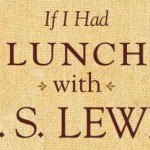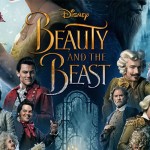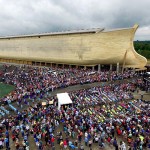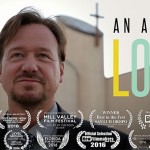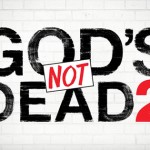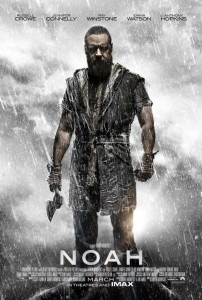 In my previous post about “Noah,” I observed: “Like any artist with a singular vision, Aronofsky’s work is often uneven and polarizing, but always thought-provoking and engaging.” I didn’t realize how prescient those words would be. Though intended to describe Aronofsky’s entire oeuvre, that sentence turned out to be an apt summation of my feelings after seeing “Noah.” Uneven? Definitely. Thought-proving? Undoubtedly.
In my previous post about “Noah,” I observed: “Like any artist with a singular vision, Aronofsky’s work is often uneven and polarizing, but always thought-provoking and engaging.” I didn’t realize how prescient those words would be. Though intended to describe Aronofsky’s entire oeuvre, that sentence turned out to be an apt summation of my feelings after seeing “Noah.” Uneven? Definitely. Thought-proving? Undoubtedly.
Spoiler Alert: I reveal some plot elements that aren’t in the Bible and are key to the movie. If you haven’t yet seen it and plan on doing so, don’t continue … you’ve been warned!
First, the uneven.
Aronofsky’s Watchers are the ultimate Gnostic archetypes: beings of pure light entrapped by the muck of the material world, yearning for release from the bondage of physicality. But the Watchers, as depicted by Aronofsky, are lumbering, cartoonish beasts, an awkward and uninspired mix of Ent, Transformer and Muppet that would be laughable if not for the naïve earnestness of their role in the script.
The film would have been far stronger had they been omitted entirely, along with the underwhelming battle scene in which they featured. Aronofsky is clearly at his best when examining the psychological motivations and interactions of his human characters, not when orchestrating CGI battles featuring ballet dancers with yoga boxes taped to their arms and legs.
Rather than further bemoaning this misstep, I have another interpretation of these Watchers that offers at least a bit of reprieve: that they are intentional references to our cinematic mythology and deliberately unsettling reminders that we are watching a film that is far from perfect. The Watchers seem so false and out-of-place, so poorly conceived and awkwardly rendered, precisely because we are judging them in light of our intimate familiarity with myriad expressions of modern cinematic myth.
They are a potent reminder that, just as the people of the Ancient Near East had stories to make sense of the world around them, so we too cling to tales to help fashion meaning out of reality. The story of Noah is merely the antecedent of our own mythologies; each has their relative strengths and weaknesses and each must be evaluated within their own contexts and on their own terms.
But despite the distraction of the Watchers, “Noah” still offers fertile ground for theological and philosophical reflection.
At the heart of the film is a masterful exploration of the mimetic desire that drives humanity toward violent confrontation. Aronofsky’s antediluvian world is shaped by murder, Cain’s single act of violence reverberating through virtually every aspect of life, pushing humanity toward ever greater strife in desperate attempts to regain what was lost so long ago.
Aronofsky also shows us the only antidote to that pervasive and pernicious violence: love. His postdiluvian world is founded on love, where Noah’s choice to place innocent life above his own will — and even above his perception of God’s will — sends a decisive message about the priorities of the new creation.
Noah’s selfless choice in favor of love gives humanity a second chance, and in his refusal to sacrifice his grandchildren for a supposed greater good we see mirrored God’s refusal to sacrifice all of humanity despite our constant failures. We are deeply flawed creatures, bent on defilement and destruction and death, but we also have, inside ourselves, the ability to rise above selfishness and greed and jealousy and to choose what is good and just and right.
The film asks us to confront what it means to be able to make that choice for good, what it means to be bearers of the imago dei: are we reflecting God’s image by exercising dominion over creation, taming it and subduing it and bending it to our own will? Or do we best reflect God when we show his love, choosing love even when such a choice challenges our preconceptions?
The story of Noah is a story of choices. In Genesis, it is about God’s choice to push the reset button on creation and his choice to save Noah and his family. In Aronofsky’s film, it also about Noah’s choice of love.
As humanity continues to push our world and our lives out of balance, the choices we make inevitably have consequences. Those consequences may not take the form of a divinely instigated global deluge (though anthropogenic climate change may eventually have just such an effect), but nevertheless justice must eventually be served and balance must be restored. As in “Noah,” there is only one choice that promises to guide us towards peace and justice: love.
The words of 1 Peter 4:7-8 would have been timely before the Flood and are even more timely today:
The end of all things is near. Therefore be alert and of sober mind so that you may pray. Above all, love each other deeply, because love covers over a multitude of sins.
 Dan Wilkinson
Dan Wilkinson
Dan is a writer, graphic designer and IT specialist. He lives in Montana, is married and has two cats. He blogs at CoolingTwilight.com.


